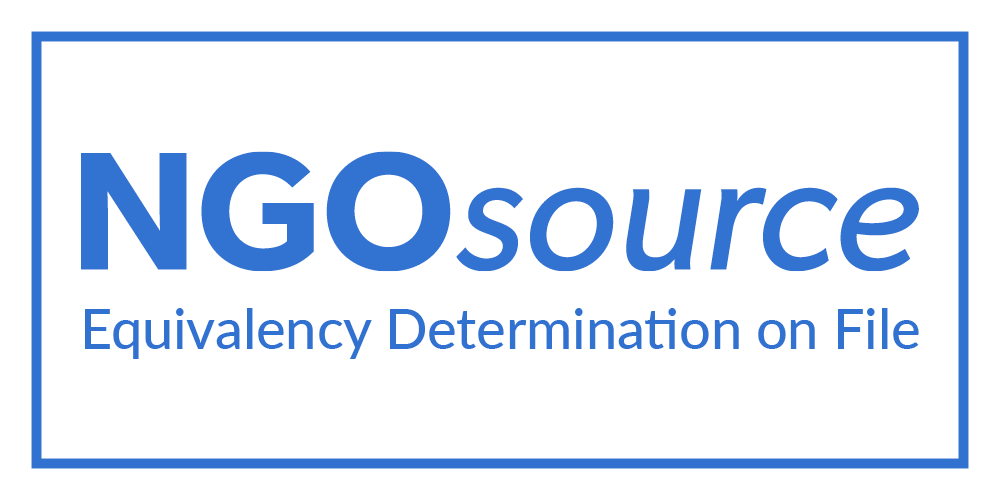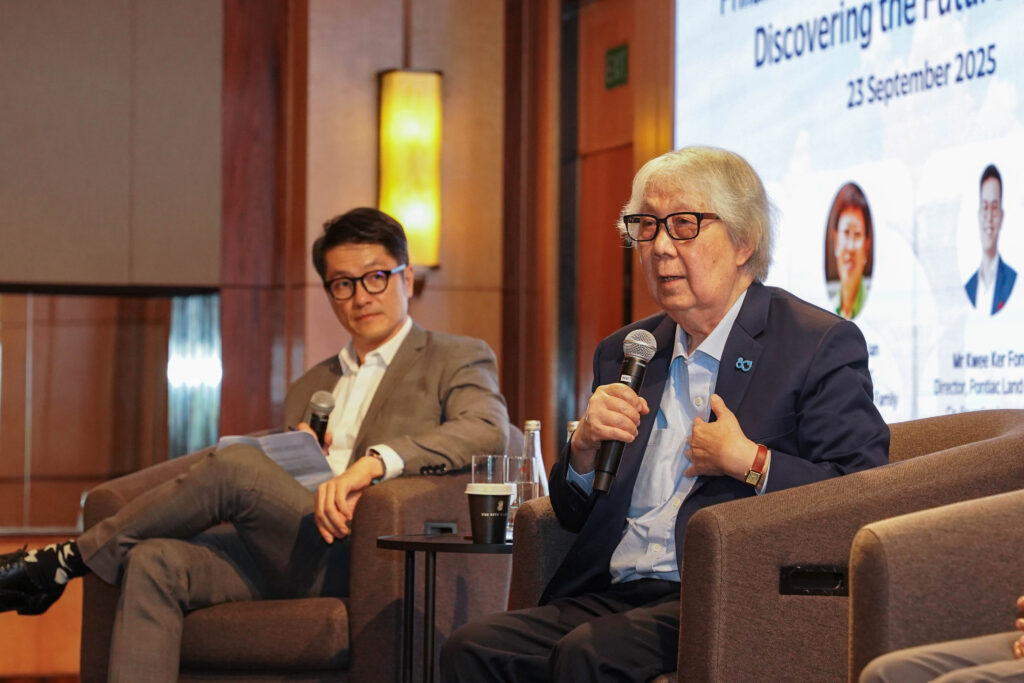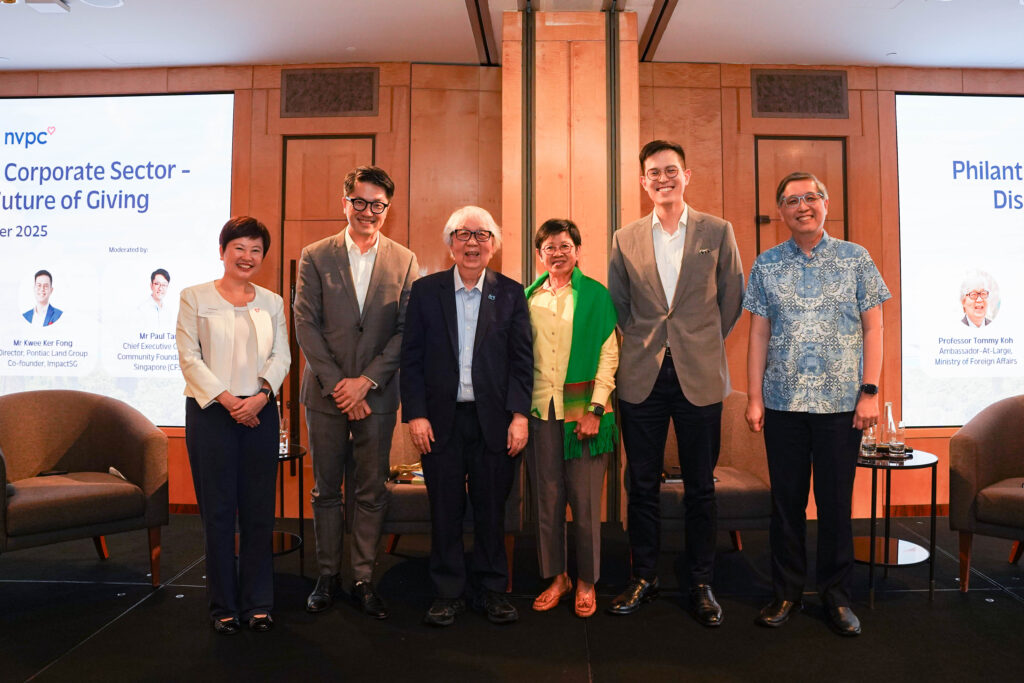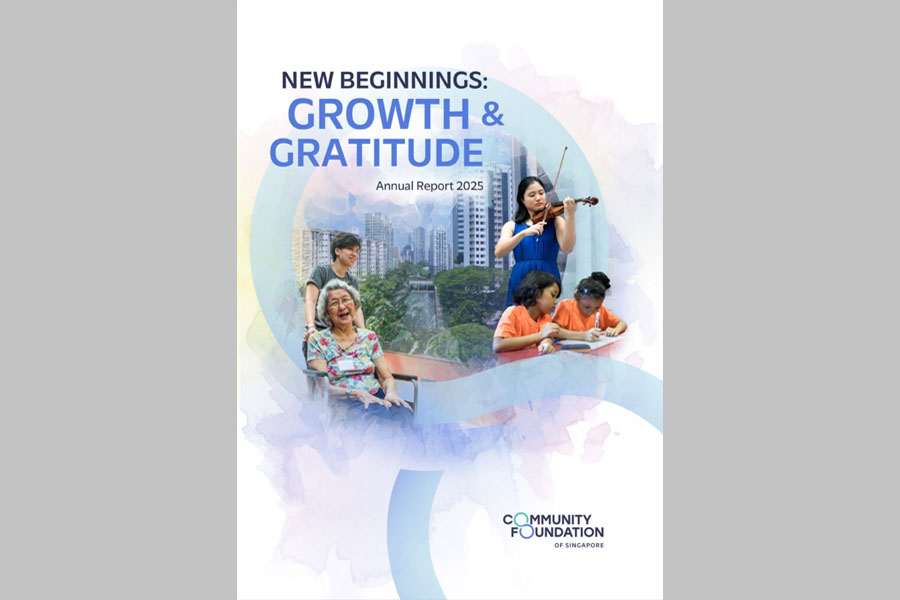Corporate Governance
The Community Foundation of Singapore complies with the requirements of the Code of Governance for Charities and Institutions of a Public Character (IPCs) and is committed to upholding the values of accountability and transparency within our organisation.
CFS has achieved ED certification since 30 July 2020. NGOsource has certified that CFS is equivalent to a U.S public charity.
The CFS Board of Directors is responsible for ensuring that the organisation is well governed and its resources managed responsibly and prudently to achieve its overall purposes as set out in its constitution.
Responsibilities
The Board sets the strategic direction and long-term goals to advance CFS’ overall objectives and periodically reviews its vision, mission and Constitution to maintain their relevance and ensure compliance. The Board focuses on policy development, strategic planning and governance oversight to steer CFS’ long-term growth. It also reviews and approves the annual work plans, making sure that they align with CFS’ objectives.
To safeguard CFS’ financial resources, the Board ensures that funds are dedicated solely to its charitable purposes. It sets policies on financial limits and internal controls and is responsible for approving the annual budget and audited financial statements. The Board regularly reviews progress reports and financial updates to support the organisation’s long-term financial sustainability.
The Board oversees and actively reviews CFS’ governance practices to uphold high standards of accountability. It promotes transparency and regulatory compliance by overseeing the preparation of annual reports and fulfillment of statutory reporting obligations. Additionally, the Board sets strategies and policies that support sustainable operations and foster strong stakeholder relationships. The Board is also responsible for ensuring leadership continuity and overall board effectiveness through succession planning and fostering diversity within the Board.
The roles and responsibilities of the Board and Management are clearly defined and distinct. The Board is responsible for providing strategic direction, governance oversight, and ensuring accountability, while Management is responsible for the day-to-day operations and implementation of the strategies and policies approved by the Board
Board Composition
As at the end of the financial year, the Board comprises twelve directors, including two ex-officio positions who are representatives of Minister of Culture, Community and Youth (“MCCY”) and the National Volunteer & Philanthropy Centre (“NVPC”). The Board includes professionals and individuals from both public and private sectors such as banking and finance, law, business, philanthropy and the non-profit community with diverse backgrounds, expertise, and experience that are relevant to CFS’ mission and work. As a group, the directors bring a wide range of competencies and diverse perspectives to the board deliberations and decisions. Profiles of the directors can be found on pages 8 and 9 of this Annual Report.
All directors are fully independent and appointed based on their expertise, experience, commitment as well as ability to contribute to the achievement of CFS’ objectives. The independent directors play a critical role in ensuring that strategies proposed by Management are constructively challenged, thoroughly discussed, and aligned with CFS’ mission and long-term objectives.
The CFS constitution does not permit remuneration of the Board. Directors serve on a voluntary basis and do not receive any remuneration for their serving on the CFS Board
Board Renewal
CFS is committed to maintaining a dynamic and effective Board through regular renewal. The Board regularly reviews its composition to maintain an appropriate balance of skills, experience, and diversity. It ensures that the selection of Directors is fair, consistent and non-discriminatory on the grounds of age, gender, race, religion and gender to build a well-diversified board.
The Nominating Committee (NC) oversees the appointment and re-appointment of directors, ensuring adequate succession planning and optimal mix of skills and experience needed to best lead and govern the organisation. Succession planning is in place to ensure leadership continuity and enhance Board resilience. As part of the nomination process, all prospective candidates undergo rigorous background checks to confirm their eligibility and suitability for the role.
The Chairperson of the Board is appointed by the Minister for Culture, Community and Youth. All Board appointments and re-appointments are conducted in accordance with the CFS Constitution and approved by MCCY. Directors are appointed for a term of up to three years and may be re-appointed for one consecutive term by the Members of CFS at the Annual General Meeting. No directors may serve for a continuous period of more than six consecutive years, and the Chairperson of the Finance Committee may serve a maximum of three years in the role. As of the reporting period, no Director has served on the Board for more than 10 consecutive years.
Board Effectiveness
The Board conducts a self-evaluation annually to assess its performance and effectiveness, and to identify areas for improvement. The Nomination Committee reviews the feedback from these reviews and incorporate the insights into ongoing Board development and improvement efforts to improve the overall effectiveness of the Board. During the financial year, the Board participated in the BoardPulse survey and BoardPulse workshop facilitated by an external consultant from Centre for Non-Profit Leadership (“CNPL”), a division of National Volunteer & Philanthropy Centre (NVPC). This assessment provided insights into Board’s effectiveness and leadership capabilities, highlighting key action and developmental areas to better support CFS’ strategic goals.
Induction and Training
To promote good governance, all newly appointed directors undergo an induction programme led by key members of the senior management to familiarise them with CFS’ mission, strategic focus, work plans operations, and regulatory obligations. Each new director receives a board kit containing the company’s Constitution, Code of Conduct, governance framework, organisational structure, financial information and relevant legislation and Code of Governance.
Ongoing training and development opportunities are provided to keep directors informed of their fiduciary responsibilities and relevant regulatory changes under the Charities Act, Companies Act, and Code of Governance. Directors are encouraged to participate in external courses and briefings to stay current with governance, financial, legal, and sector-specific developments. In addition, the Management also gives quarterly briefings at Board meetings to update the Board on the performance of key focus areas and sector development. Directors are also invited to CFS’ events to understand CFS’ business activities and its impact on the community.
Board Meetings
Board meetings are held on a quarterly basis to review the performance of the Company, its plans and key updates. As a general rule, Board papers are sent to directors about one week before each meeting to allow them to prepare for the meetings and enable effective discussions. The deliberations, discussions, views and decisions are recorded in the minutes of meetings, which are circulated to all directors in a timely manner.
For CFS Board Meeting Attendance for Year 1 April 2024 – 31 March 2025, please refer here.
| No | Current Directors | Board Meeting Attendance |
|---|---|---|
| 1 | Christine Ong | 4/4 |
| 2 | Janice Ang | 3/4 |
| 3 | Chew Kwee San | 3/4 |
| 4 | Sebastien Lamy | 4/4 |
| 5 | Trina Liang-Lin | 3/4 |
| 6 | Ong Chao Choon | 4/4 |
| 7 | Philip Ong | 3/4 |
| 8 | Stefanie Yuen Tio | 3/4 |
| No | Retired Directors | Board Meeting Attendance | Retirement Date |
|---|---|---|---|
| 1 | Fong Cheng Hong | 2/2 | 31 August 2021 |
| 2 | Sumitra Sajen Aswani | 2/2 | 31 August 2021 |
| No | New Directors | Board Meeting Attendance | Date Joined |
|---|---|---|---|
| 1 | Seah Chin Siong | 3/3 | 1 June 2021 |
| 2 | Adelene Tan | 3/3 | 1 June 2021 |
| 3 | Mark Tham | 1/2 | 1 September 2021 |
To support effective governance and oversight, the Board has formed the following Board Committees to assist the Board in specific initiatives and duties:
Audit & Risk Committee
The Audit and Risk Committee ensures that management establishes internal controls policies and procedures to safeguard and protect CFS’ assets and that a proper reserves policy and enterprise risk management policy are implemented. The Committee oversees the appointment and work of internal and external auditors, including approving audit plans, reviewing their findings and effectiveness, and addressing any issues raised. It also reviews the audited financial statements before they are presented to the Board for approval.
Donor Development & Philanthropic Impact Committee
The Donor Development & Philanthropic Impact Committee assists the Board in ensuring CFS’ compliance with the Code of Governance on good fundraising practices, and advises on donor stewardship as well as grantmaking policies and strategies. The Committee’s role is to support the Board in strengthening governance and enabling sustainable growth of the donor base and grants disbursed.
Finance and Human Resources Committees
The Finance and Human Resource Committee supports the Board in meeting its financial responsibilities and ensures that the necessary resources are available to achieve CFS’ corporate objectives. It reviews finance policies, procedures and budget as well as recommends to the Board any measures to enhance long term financial sustainability. It also provides oversight on human resource policies covering recruitment, compensation, performance appraisal, and succession planning, and ensures that it has the right staff and resources to operate efficiently and effectively.
Investment Committee
The Investment Committee oversees the management and investment of CFS’ funds and financial assets with care, prudence and diligence in accordance defined investment objectives and policies. It sets spending policies, determines fund-specific constraints, and reviews asset allocation regularly. The Committee appoints, evaluates, and reviews external fund managers and custodians, and reports on fund performance to the Board and donors biannually.
Nomination Committee
The Nomination Committee ensures that CFS has the right Board and committee members to carry out its work efficiently and effectively. The Committee regularly reviews the Board’s structure, size, and composition, and makes recommendations on necessary adjustments. It oversees Board and senior leadership succession planning, nominates candidates for Board approval, and ensures new appointees understand their roles.
Technology & Operations Advisory Committee
The Technology & Operations Advisory Committee provides strategic advice to the Management team, specifically in its digitalisation efforts in technology and operational efficiency improvement via process simplification or system automation.
CFS has in place policies and procedures to manage and avoid situations of conflict of interest. In accordance with the Constitution, Directors must disclose any direct or indirect interest in a matter or transaction to be discussed before deliberations commence, and abstain from participating in the Board’s decision in respect of the transaction concerned. In alignment with CFS’ prevailing Conflict of Interest policy, all Board and committee members are required to make declarations of conflict of interest to CFS at the start of their terms, annually, and as soon as such conflict or the possibility of such conflict arises. Conflicted individuals may participate in discussions but do not vote or engage in any form of decision-making on matters where they have a conflict of interest. This ensures transparency, integrity, and objective decision-making in the best interests of CFS.
The code of conduct for staff includes the Conflict of Interest policy that necessitates strict adherence from all staff. Staff are required to ensure that their personal activities and interests do not conflict with their professional responsibilities to CFS. All staff are also required to make declarations of conflict of interest at the point of hire, annually and as soon as the possibility of such conflict arises. These measures safeguard transparency and ensure that all parties act in the best interests of CFS.
CFS is committed to the principles of accountability and transparency. To adhere to these principles, CFS regularly makes available information regarding our activities, programmes, operations, audited financials, Board and Management through our annual report, website and social media pages.
All Board Directors do not receive any remuneration for their services in their capacity as Board Directors. In line with the Code of Governance, CFS discloses the remuneration of key management staff earning above S$100,000 in incremental bands of S$100,000. During the financial year, no staff employed by CFS were close family members of the CEO or Board Directors.
CFS has been recognised for its governance excellence, receiving the 2019 Charity Transparency and Charity Governance Awards (Special Commendation – Governance & Management) and 2024 Charity Transparency Award.
To find out more about the introductory profile and past job experiences of our Executive Management, please click here.
CFS is committed to maintaining robust financial management practices and internal controls to safeguard its assets and ensure responsible stewardship of funds. The Board oversees the financial health of the organisation through regular review of financial reports, budgets, and audits.
Budget Planning and Monitoring
The Finance and Human Resources committee and the Board review and approve the annual budget prepared by management. All extra-budgetary expenditure beyond the delegated management authority is reviewed and approved by the Finance and Human Resources committee and Board, and the operating and capital expenditure budget is regularly monitored.
CFS is committed to disclosing audited statements that give a true and fair review of CFS’ financial statements to ensure that they are in accordance with the requirements as specified by the regulatory bodies. External auditors are appointed to provide an independent assessment of the financial statements, with their findings reviewed thoroughly by the Audit and Risk Committee. Through these measures, CFS ensures transparency, accountability, and long-term financial sustainability in line with best practices in corporate governance.
Operational Controls
Strong internal controls are in place to mitigate risks and ensure accuracy and integrity in financial reporting. Written policies and procedures are in place for financial matters in key areas, which include procurement and controls, receipting, payment procedures, controls and system for the authorisation matrix and limits of approval.
CFS adopts a rigorous enterprise risk management framework, and internal audits are conducted yearly on key aspects of our operations. Both the external and internal auditors report to the Audit and Risk committee.
CFS does not conduct fundraising activities for our operating expenses. Our operating expenses are primarily funded by the Government, private grants and fees charged for our services.
CFS may raise donations for the Community Impact Funds that we manage. These donations go entirely towards the operation of the stated programmes and providing support to the beneficiaries.
Please refer to the CFS Annual Report 2025 for our latest Governance Evaluation Checklist. This is for the fiscal period from 1 April 2024 to 31 March 2025.
CFS administers a Code of Ethics and a set of guidelines for employees to comply with, and this is made available to all employees. CFS understands the importance of and commits to incorporating systems that address employee communication, fair practice, performance management and professional development.
CFS focuses on hiring and talent development practices to ensure that we hire the right people with the skills and attitude to excel in their roles. We have a fair and objective performance management process. The objectives required for each employee ensure that everyone knows how they are contributing to the success of CFS. Concurrently, a comprehensive set of competencies matched to job requirements ensures that staff are trained and ready for their jobs. In addition, our supervisors are committed to helping staff thrive in their careers by making learning opportunities available to ensure their success for existing and future responsibilities.
CFS does not have paid staff who are close members of the family of the CEO or Board of Directors.
Staff are not involved in setting their remuneration.
CFS invests the endowment funds, other restricted funds and reserves to ensure that the value of these funds is not eroded by inflation and that they may grow over time to support the increasing needs of the intended beneficiaries.
The Investment Committee manages CFS’ funds with care, skill, prudence and diligence and for the sole interest of the beneficiaries of the funds and in accordance with their objectives. Investments of the funds are diversified to minimise loss from diversifiable risks while earning a fair return. The investments are made by external fund managers selected by the Investment Committee and approved by the Board.
CFS is a charity registered as a Company Limited by Guarantee with a Institutions of a Public Character (IPCs) Status. We were incorporated on 08 Sep 2008 with a UEN number of 200817758M.
Our IPC status is effective from 22 Sep 2025 to 21 Sep 2028 (both dates inclusive).
CFS is concerned about the possible consequences that Money Laundering and Terrorist Financing may have on the integrity and stability of the financial sector and the broader economy. We take preventive measures to combat activities by maintaining high financial transparency through proper accounting and internal control procedures and maintaining good administrative, managerial and policy controls over our operations.
Donors wishing to establish donor-advised funds with CFS go through stringent Know-Your-Donor checks. Similarly, our grantees go through our Know-Your-Grantee checks before they are eligible to receive grants from CFS.
CFS is committed to safeguarding the privacy of all personal data provided to us, including all personally identifiable data, such as the individual’s name, birth date, e-mail address or mailing address, and any other information identified with the individual personally. All electronic storage and transmission of personal data are secured with appropriate security technologies.
By visiting, using and/or accessing the Community Foundation of Singapore (CFS) website in any way, you fully understand and expressly consent to CFS’ Personal Data Protection Act (PDPA) policies and procedures for collection, use, disclosure, access, correction, accuracy, protection, retention, transfer and withdrawal of your personal data for the following purposes:
- Awareness and Outreach programmes
- Corporate giving programmes
- Fundraising programmes
- Philanthropy programmes
- CFS grants
- CFS news, events, publications, media releases & reports
If you choose to contact us or send us information for which you provide us with personally identifiable data, we may share necessary data with other partner organisations to process the information in a most efficient and effective way, unless such sharing is prohibited by law.
For your convenience, we may also display to you the data you had previously supplied us. This will speed up the transaction and save you the trouble of repeating previous submissions. Should the data be out-of-date, please provide us with the latest data. We will retain your personal data only as necessary for any business or legal purposes. All electronic storage and transmission of personal data are secured with appropriate security technologies to safeguard your personal data.
This site may contain links to non-CFS sites whose data protection and privacy practices may differ from ours. We are not responsible for the content and privacy practices of these other websites and encourage you to consult the privacy notices of those sites.
You understand and agree for CFS to contact you for any other purposes related to the services that CFS is providing or had provided you with and/or on matters which you have an ongoing relationship with CFS. If you do not agree with any of the terms and conditions, please do not visit, use and/or access this website.
Frequently Asked Questions
1. What personally identifiable information does CFS collect?
CFS’ primary goal in collecting personal information is to provide you with the best and most useful content and services. CFS collects personally identifiable information when you provide it to us, such as when you register on our site, and when you visit CFS pages and subscribe to any of our services. Once you register with our site, you are no longer anonymous to us.
2. What anonymous information does CFS collect?
Your Internet browser has a feature called “cookies”, which store small amounts of data on your computer about your visit to any of our sites. However, cookies tell us nothing about who you are unless you specifically give us personally identifiable information. We use tracking technologies in a variety of ways, including:
- Keeping count of return visits to our site or our advertiser’ or partners’ sites.
- Accumulating and reporting anonymous, aggregate (data collected in mass), statistical information on website and advertisement usage.
- Determining which features users like best.
3. How does CFS use the information?
The information we gather is mainly used for general purposes, including:
- Enhance the user experience in our network of sites. We use tracking information to determine how well each page
- Performs overall based on aggregate user demographics and traffic patterns to those pages. This helps us continue to build a better service for you.
- Fulfil your requests for certain products and services.
- Customise the content you see.
4. What are my options?
Users who would rather not provide any user data requested by our registration process do not need to register with us. You can still view much of the content without registering.
5. How will I know if the privacy policy is changed?
Any modifications to our privacy practices will be reflected first on our site. If there is a material change in our privacy practices, we will indicate on our site that our privacy practices have changed and provide a link to the new privacy statement.
An operating reserve is an unrestricted fund balance set aside to stabilise CFS’ finances by providing a cushion against unexpected events, opportunity or community needs and to fund any new projects or activities that further the strategic objectives of CFS.
The reserves policy applies to that part of the foundation’s income funds freely available for its operational purposes. It excludes endowment, restricted and designated funds established by donors. It is the intention of the Board of Directors to ensure that the level of reserves is adequate to sustain CFS for a period up to two years, with sufficient time to build an alternative source of income.
CFS’ reserves stood at 1 years of operating expenditure as of 31 March 2025.
Volunteers can bring diverse perspectives, specialised skills and fresh insights to CFS that enhances our effort to inspire philanthropy in Singapore. Our volunteers are primarily contributing at the Board and Committee levels, where they actively support governance and strategic initiatives. Their roles and responsibilities are clearly defined in the Terms of References provided to them prior to their appointment. The Board is largely responsible for the recruitment of these volunteers. Additionally, CFS occasionally recruits volunteers for ad-hoc skills-based volunteering projects.
To equip volunteers with a comprehensive understanding of CFS, training is conducted through regular engagement sessions led by the Board and Management. These sessions provide volunteers with in-depth knowledge of CFS’ vision, mission, objectives, strategic priorities, and ongoing work plans. A structured onboarding programme and continuous training opportunities are in place to help volunteers contribute effectively and align their efforts with the organisation’s long-term goals and values.
CFS is committed to the highest standards of honesty, transparency, ethical and legal conduct and accountability. The whistleblowing policy aims to provide an avenue for employees and external parties to raise genuine concerns relating to any aspect of CFS’ operations, including serious breaches of the code of conduct by employees. The aim of the policy is to:
- Promote standards for sound financial and corporate practices and deter wrongdoing.
- Provide proper avenues for employees and external parties to raise concerns about suspected improprieties and receive feedback on any action taken.
- Give employees and external parties the assurance that they will be protected from reprisals or victimisation for whistleblowing in good faith.
Reportable Incidents
Some examples of concerns covered by this policy include:
- Impropriety, corruption, theft/misuse of CFS’ properties/assets/resources.
- Conduct which is an offence or breach of law.
- Breach of or failure to implement or comply with CFS’ policies.
- Concerns about CFS’ accounting, internal controls or auditing matters.
- Serious conflict of interest without disclosure, resulting in material gain.
- Acts that mislead, deceive, manipulate, coerce or fraudulently influence any internal or external accountant or auditor in connection with the preparation, examination, audit or review of any financial statements or records of CFS.
- Abuse of power or authority, for example, Finance Director asking Finance Manager to make false declarations on company’s accounts.
- Physical and emotional bullying by colleagues.
- Sexual harassment:
A. Physical harassment (sexual gestures, inappropriate touching etc.).
B. Verbal harassment (sexual comments/jokes, asking for sexual favours etc.).
C. Visual harassment (showing derogatory or pornographic materials etc.).
D. Any other serious improper matters may cause financial or non-financial loss to CFS or damage to CFS’ reputation. - Fraud or the making of fraudulent statements to members of the public and regulatory authorities.
- Concealing information about any malpractice or misconduct.
- Intentional provision of incorrect information to public bodies.
Procedure Protection against reprisal
CFS recognises that the decision to report a concern can be challenging to make, not least because of the fear of reprisal from those responsible for the alleged malpractice. CFS will not tolerate harassment or victimisation and will take all possible action to protect anyone who raises a concern in good faith.
However, CFS does not condone frivolous, mischievous or malicious allegations, and anyone making such allegations may face disciplinary action.
Confidentiality
CFS requires the whistleblower to identify himself/herself when raising a concern or providing information. All concerns will be treated with the strictest confidentiality.
Exceptional circumstances under which information provided by the whistleblower could or would not be treated with confidentiality include:
- Where CFS is under a legal obligation to disclose information provided.
- Where the information is already in the public domain.
- Where the information is given on a strictly confidential basis to legal or auditing professionals for the purpose of obtaining professional advice.
- Where the information is given to the police or other authorities for criminal investigation.
In the event of a circumstance not covered by the above, and where the whistleblower’s identity is to be revealed, CFS will endeavour to discuss this with the whistleblower first.
Anonymous complaints would be investigated only if there are clear merits for continuity.
Procedure
Concerns should be raised in writing to whistleblow@cf.org.sg. The e-mail will directly reach the Chairman of the Audit & Risk Committee.
The whistleblower should detail the background and history of events and the reasons for the concern. Important points to note:
- The earlier the concern is raised, the easier it is for CFS to take action.
- CFS expects the whistleblower to provide his/her concern in good faith and to show that there are sufficient grounds for his/her concern.
- CFS also recognises that the whistleblower may wish to seek advice and be represented by his/her advisor.
Proceedings upon disclosure
Any concern raised or information provided will be investigated. Consideration will be given to these factors:
- Severity of the issue raised.
- Credibility of the concern or information.
- Likelihood of confirming the concern or information from attributable sources.
Depending on the nature of the concern raised or information provided, the investigation may involve one or more of these persons or entities:
- The Investigation Committee appointed by the CEO/Audit & Risk Committee.
- External and internal auditors.
- Forensic professionals.
- The police or Commercial Affairs Department.
Further information may be sought from the whistleblower during the course of the investigation.
The Investigation Committee will submit the findings and recommendation(s) to the CEO or Chairman of the Audit Committee for his/her necessary action/advice.
The whistleblower will be kept informed of the progress of the investigations and, if appropriate, of the final outcome.
You May Be Interested In
How We Assist Donors
Transform your generosity into impact.
Donor-Advised Funds
A simple, cost-effective and powerful way to give.
Causes We Support
The 13 charitable areas we focus on.
Who We Are
Our identity as a community foundation.
What We Do
Discover how we grow philanthropy in Singapore.
How We Support Charities
Together, we drive impact for the community.
Our Team
Learn about our diverse and trusted leadership.
Legacy Giving
Leave a Greater Gift.
Our Publications
Access CFS reports and brochures here.
Community Impact Funds
Give with others for greater community impact.
Collectives
Drive large-scale impact through collaboration.
Latest News & Media


齐心祎:传承,不止于财富——从“Stewardship”谈家族、企业与社会的责任
齐心祎:传承,不止于财富——从“Stewardship”谈家族、企业与社会的责任











